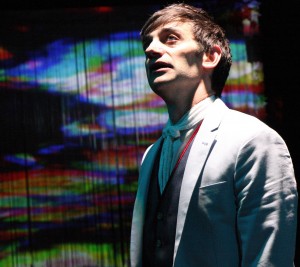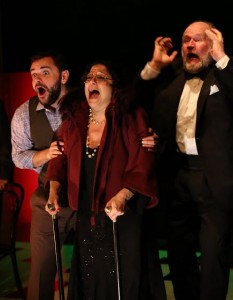Idiot, now at the lovely main space at HERE, is a feast of multimedia effects. With crisscrossed Persian carpets forming aisles that divide the audience into four quarters, video panels above, and heated Oriental rhythms in the background, the story unfolds. How to capture the innocence and depths of the epileptic Prince Lev Myshkin, portrayed by Daniel Kublick, in this theatrical version of and hommage to the great Dostoevsky novel? With a script that focuses on the tempestuous relations of four key characters of the Dostoevsky work; with philosophical riffs; with inventive use of video, light, and sound; with song, dance, gesture and interaction with the audience! This is immersive theater, a specialty at SoHo’s HERE, an award-winning theater organization devoted to the support of new work that cuts across artistic disciplines. Eve Ensler’s The Vagina Monologues was developed at HERE.
If romantic triangles usually involve a triad, the triangle in this case has four corners: the lascivious Parfyon Rogozhin is obsessed by Nastasya Filippovna. Her hand in marriage, however, is also sought by the Prince who is, at the very same time, in love with the vivacious Aglaya Epanchin. The central conflict of the play, then, concerns the Prince’s love for both women.
The fallen, dissolute, but proud Nastasya Filippovna, fetchingly portrayed by Purva Bedi, disdains money (at one point she throws 100,000 rubles of Rogozhin’s money into a fire) and sees through the lies of others no less than the mind-reading Prince himself, who loves her “out of pity.” Lauren Cipoletti plays Aglaya. Also loved by the gentle Prince, and a beauty of good family standing, Aglaya shares much with him, including a great love of children. The blue-eyed, soulful and energetic Prince Myshkin, beautifully performed by Daniel Kublick, is the “idiot” of the title.
Rogozhin is played with verve and flourish by Merlin Whitehawk. The audience is treated to extremes of passion of the most brutal and delicate varieties; a motif of execution to emphasize the underlying question of life, its purpose and the experience of it; as well as the stormy relations among a virgin-harlot dyad (the female characters), a lecherous drunk, and an invalid Prince who is spiritual and hardly of this world.
This is the third partnering of Robert Lyons (text) and Kristin Marting (director and choreographer) in the adaptation of a work by Dostoevsky. And theirs is a rollicking and “immersive” production, to say the least. The point of immersive theater is to move past the limits of merely “watching” a staged production in order to create an experience that is more active, richer, and, presumably, deeper by “immersing” the audience in multiple theatrical effects. Always, the question must finally be asked, what exactly was accomplished by all of these theatrical goings-on?
There were arresting moments in this production. On several occasions, the sound of the Prince’s speech is engineered so that his words are somewhat muffled and have the distant sound of an echo, brilliantly suggesting the interiority of his spoken thoughts. At another point, the Prince is deeply moving as he wanders among the audience, accosts individual audience members and soliloquizes on the subject of human love, bringing some in his audience to tears.
But, for the most part, inventive use of video, gesture and dance, the dramatic story and interludes of deeper rumination do not, finally, cohere to immerse us in anything more than that spectacle itself. We are entertained but, finally, not enlarged in the course of this production.
It is unfair to require the depth of spiritual exploration and of character that is the greatness of the large and rambling Dostoevsky novel. This is another work entirely, in another genre entirely. The achievement of Dostoevsky cannot be condensed into a mere 75 minutes. But it is not unfair to ask that the heart and soul be moved in the course of those 75 minutes and, given the extremes of human feeling and experience brought into view, moved deeply. That, one would hope, is the real goal of the best work in experimental immersive theater.
Idiot plays through May 21 at HERE Arts Center (145 Sixth Ave.; entrance on Dominick Street). Performances are at 8:30 p.m. Tuesday through Sunday. Tickets are $25 and can be purchased at www.here.org or by calling (212) 352-3101 or at the HERE Box Office (5 p.m. until curtain on show days).










